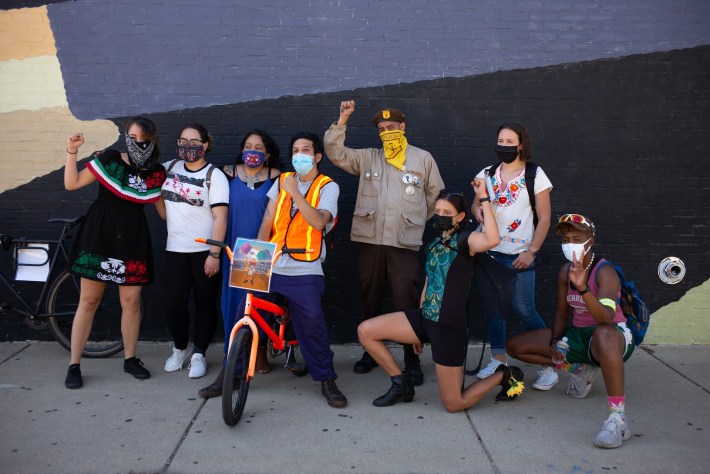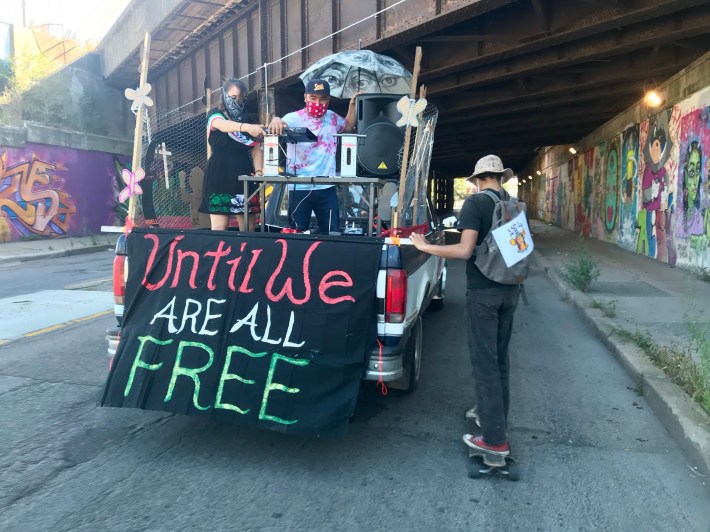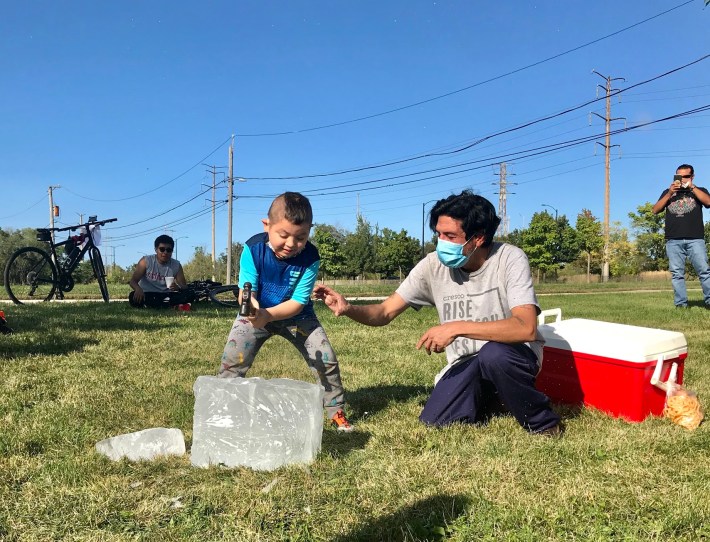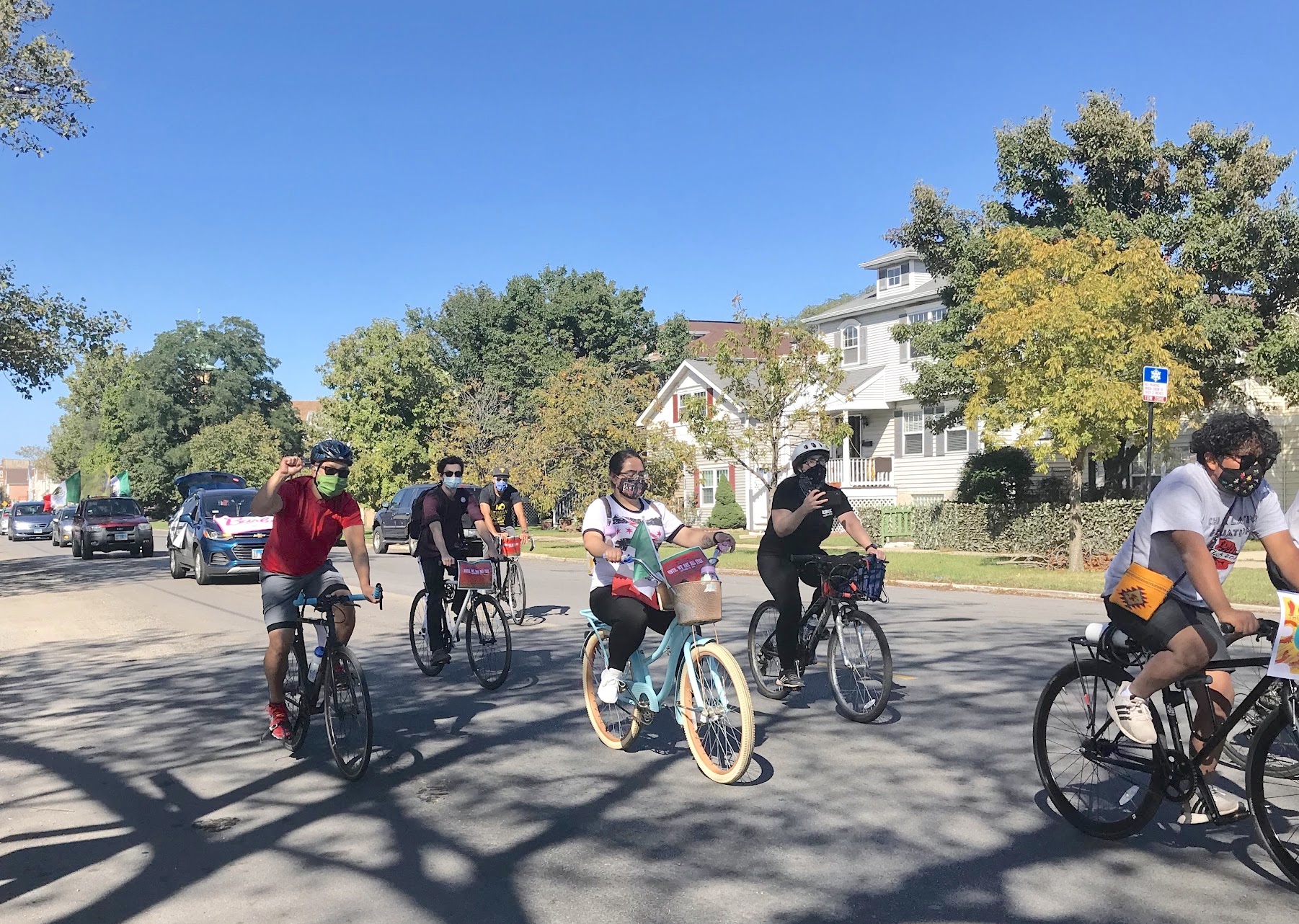Sunday’s sunshine and community spirit brought people on bikes and in cars, plus local DJ Barbi, to the Southeast Side to celebrate Mexican Independence Day, but to also call attention to the political system that has separated families at the border, detained children and discriminated against immigrants.
Local collective Bridges/Puentes: Justice Collective of the Southeast hosted the “Until We Are All Free” caravan around South Chicago, Jeffrey Manor ,and the East Side. The area is home to the longest-running Mexican Independence Day parade, which began in 1939 at a time when immigrants were discriminated against and many were deported back to Mexico during the Great Depression in what was called The Great Repatriation. The current government’s immigration crackdown, along with the COVID-19 pandemic’s disproportionate impact on Latinx communities, makes it feel like history is repeating itself.

The informal raids during the Depression led to the deportation of about 1.8 million people for supposedly stealing U.S. jobs. In a grave injustice, along with recent immigrants from Mexico, roughly 60 percent of those deported were actually American citizens of Mexican ancestry. A goal of Sunday's caravan was to highlight and reenact the U.S. government's unfair treatment of Mexicans, including that forced expulsions of Americans from their own country.
“The first parade was because of pride and independence but [it was also] a cry of, ‘We belong here too and we are present here too,’” said an organizer with Bridges/Puentes who asked to be identified as Vanessa. “No matter how many times this immigration system is set up to discriminate us and all migrants, we are here, we exist and we are beautiful.”
Vanessa said the South Chicago community, which is home to many families who were part the first Mexican immigration wave in the 1920s, is a very bikeable neighborhood and many residents use bikes to traverse the large area, especially lower-income people who don't own cars. She added that South Chicago is located close to the Lakefront Trail (it's also near the Burnham Greenway), and the presence of Divvy stations and, more recently, dockless electric scooters, has improved transportation access. The neighborhood is also served by the Metra Electric District line.
Christine Perez, who biked down from Pilsen to show support for the community, said she felt safe riding in the caravan because the event was well-organized and inclusive. Organizers took "corking" intersections, holding up traffic until the group of participants had passed through, and had ride marshals in front and in back of the caravan to keep the crew together. “The roads are a little bumpy but we are tough riders,” Perez said. “It’s the ‘no [person] left behind’ model.”
Perez said she wants people to see the beauty of South Chicago and its as local culture while riding through the area. “South Chicago is a very divested community with a strong mix of Mexican and Black [neighbors],” she said. “It does not have as much support and attention as it should have.”

Justin Williams, who biked from Washington Park to participate, said the caravan highlighted the importance of equitable transportation on the South and East Sides of the city, especially for Black and Brown communities cut off from basic resources like food, schools and now, COVID-19 testing. “Transportation cuts through so many issues: [Issues of access to resources] only become heightened when you don’t have multiple forms of transportation,” he said. Williams has helped local groups organize food distribution events over the summer for communities facing food insecurity during the pandemic.
Matt T., who is Mexican and lives in Tri-Taylor, said he attended the ride to show solidarity with the community in South Chicago and bring attention to the injustices brought on by U.S. Immigration and Customs Enforcement and the Trump administration. “I felt this was an important time [to show support], given the recent news of the treatment in ICE facilities,” Matt said, referring to a new Congressional report that found the agency often gives detained immigrants poor medical care and uses segregation as punishment. He said he was happy with the turnout, which consisted of a small group of people on bikes followed by more than ten cars with occupants waving Mexican flags. “It was beautiful thing to feel part of the community while also exporting the image of it.”
The caravan looped around the area, ending at the Schafer Park in the East Side. Elotes, enchiladas and snow cones were served, and participants gathered for a symbolic activity to abolish ICE. Organizers brought out a large ice cube and invited everyone to destroy the cube. Children, apprehensive at first, joined in to hammer away bits of ice that flung into the park. Parents, organizers and caravan participants also joined in, breaking up the ice until just small pieces were left. “It took a community to smash this ice. Together we can abolish ICE!” Vanessa told the crowd of about 30.

The caravan was a true display of community effort and Mexican pride, and the increasing desire for folks to stand up for what social justice looks like in their own way, which we saw a lot of this summer with bike protests and community rides. It also celebrated the long history of the neighborhood and how movements like these and help put it on the map for the city at large.
“This is a moment of pride of our legacy in the city but also it’s a cry to attention that none are free until all are free and that though we can be out here with our freedoms, to ride around on our bikes and in our cars, the system that gives us these freedoms also says it’s OK to detain children in cages, so how are we free?” Vanessa told me. “This is just a caravan, it’s not going to change the world, but we hope we can at least begin to change this consciousness and to understand that we need to be working together.”




